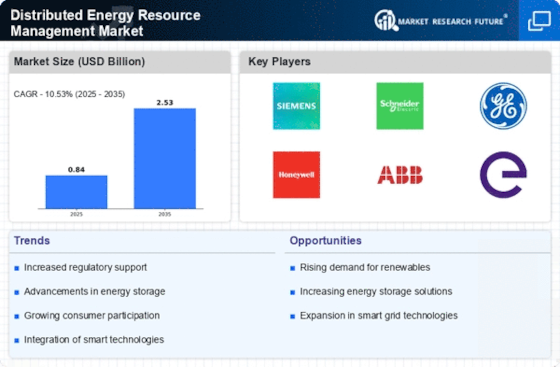Top Industry Leaders in the Distributed Energy Resource Management Market

*Disclaimer: List of key companies in no particular order
The Distributed Energy Resource Management (DERM) market is undergoing a significant surge, propelled by the increasing adoption of renewable energy sources, a growing emphasis on grid resilience, and the escalating demand for energy efficiency. In this thriving environment, competition is fierce, with established industry leaders vying for dominance and innovative startups carving out their unique spaces. The imperative to comprehend key player strategies, analyze market share dynamics, and identify emerging trends becomes paramount for effectively navigating this dynamic terrain.
Strategies of Key Players: The forefront of the DERM market features renowned players such as Hitachi ABB, Siemens, General Electric, Engie, Itron, Oracle, Generac, Energy Hub, Mitsubishi Electric Corporation, AutoGrid Systems, and others.
Analysis of Market Share: Geographically, North America currently commands the largest market share due to robust government policies promoting renewable energy and grid modernization. However, Europe and Asia are rapidly catching up, driven by ambitious decarbonization goals and increasing energy security concerns.
In terms of application, the industrial and commercial sectors currently dominate the market due to their substantial energy consumption and potential for cost savings through DER integration. Nevertheless, the residential segment is anticipated to experience exponential growth as smart home technologies and prosumers gain traction.
Regarding technology, cloud-based Software as a Service (SaaS) model DERM solutions are preferred for their scalability and cost-effectiveness. However, on-premise deployments may still find favor in regions with unreliable internet connectivity or data security concerns.
New and Emerging Trends:
Overall Competitive Scenario: The DERM market is characterized by intense competition, with players continually innovating and expanding their offerings. Collaboration and partnerships are becoming increasingly vital, as no single player possesses all the necessary expertise to cater to the diverse needs of the market. Mergers and acquisitions are also expected to reshape the landscape as established players seek to diversify their portfolios and startups look for exit strategies.
Looking Ahead: The DERM market is on an upward trajectory, driven by a confluence of factors. As the imperative for clean energy, grid resilience, and energy efficiency intensifies, DERMs will play a pivotal role in transforming our energy landscape. The ability to adapt to evolving technologies, cater to diverse market segments, and forge strategic alliances will be key for players to thrive in this dynamic and competitive environment.
Industry Developments and Latest Updates:










